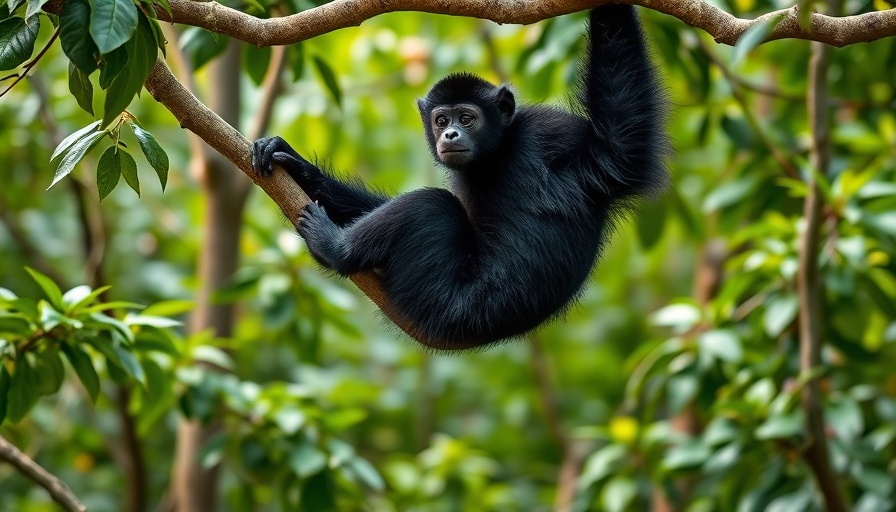
Experience Travel that Makes a Difference
Tourism can do so much more than just create memories; it can drive significant change in our world. Through high-quality carbon offsets, we can fund crucial wildlife protection, support Indigenous communities, and advance social programs aimed at reducing poverty.
When travelers choose experiences linked to carbon offset programs, they do more than visit sites; they become part of a narrative that fuels conservation and climate action. Imagine standing in a vibrant jungle, knowing that your visit is helping protect endangered species, or exploring a local community that thrives because of sustainable tourism practices. In these moments, the impact of your journey becomes clear.
Real Connections: Making Offsets Personal
Engaging with local communities and their environments provides a unique understanding of the climate crisis—and it makes the importance of carbon offsets tangible. From Tanzania to Cambodia, travelers can immerse themselves in valuable experiences that reveal the real-world implications of their travel choices.
Carbon offsetting doesn’t just finance projects; it connects travelers with stories and causes that resonate. Through firsthand experiences—from witnessing endangered wildlife to participating in community-led eco-tourism—travelers leave with not just memories, but also a deeper commitment to sustainability.
Spotlight on Cambodia: Conservation Efforts in the Keo Seima Sanctuary
Cambodia's Keo Seima Wildlife Sanctuary is a prime example of how tourism and conservation can intersect. This biodiversity hotspot, home to creatures like wild elephants and gibbons, is threatened by illegal activities that endanger both wildlife and the Indigenous Bunong people.
Carbon offset projects here fund initiatives that protect the sanctuary while empowering local communities. Two standout tourism experiences linked to this project are the Jahoo Gibbon Camp and the Elephant Valley Project, both of which help finance conservation and create alternative income streams for locals.
Jahoo Gibbon Camp: A Model for Sustainable Tourism
At Jahoo Gibbon Camp, visitors can embark on tours that allow them to witness rare species like the yellow-cheeked crested gibbon in their natural habitat. The camp is committed to providing a sustainable income rooted in conservation, engaging guests with Bunong guides who share their expertise on wildlife and local culture.
Here, travelers can also partake in activities that resonate with Indigenous traditions, from nocturnal jungle hikes to storytelling sessions. The camp exemplifies how tourism can coexist with community well-being, helping secure a sustainable future for both the people and the animals of this area.
Investing in the Future of Eco-Conscious Travel
Tour operators who embrace carbon offsets as part of their business practices are more than just travel providers—they are leaders in responsible tourism. By incorporating these meaningful experiences into their itineraries, they can reveal the direct impact of travel on local ecosystems and communities.
As guests become aware of how their trips support environmental sustainability and social development, lively conversations around climate action emerge. This shift towards purposeful travel is not just a trend; it reflects a growing demand for eco-conscious choices among travelers who care deeply about the places they visit.
The Growing Landscape of Responsible Travel
As we recognize the importance of sustainable practices, the tourism industry must adapt. This ensures that travel contributes positively to both climate action planning and local welfare. The landscape of responsible travel is changing, and now is the time for boutique hospitality professionals to lead this transformative journey.
As small-scale hotel owners and eco-lodge operators embrace sustainable travel growth, they can become ambassadors of change. Whether it's reducing carbon footprints, investing in local communities, or fostering eco-tourism practices, each step taken creates a ripple effect toward a healthier planet.
Take Action: Become Part of the Solution
Are you ready to enhance your travel experiences and make a difference? Explore eco-conscious travel programs that emphasize carbon offsets, community engagement, and sustainable practices. Your choices can support not only unforgettable journeys but also the ongoing battle against climate change.
Now is the moment to invest in your next adventure thoughtfully. Travel with intention, connect with communities, and actively contribute to conserving the environment. With every trip, you are partaking in a larger narrative of sustainability and care for our planet.
 Add Row
Add Row  Add
Add 




Write A Comment